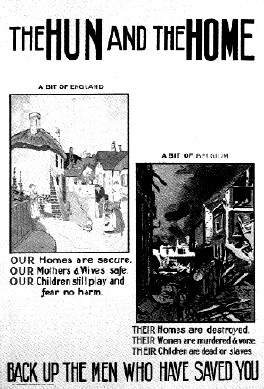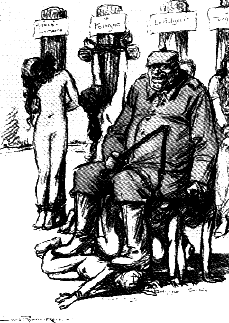Wounds
Robert W. Whalen
(Cornell)

- So, how many women are there then? Two million, maybe, who sit in their rooms and, like me, think of their dead husbands. Look out the window, and think of their dead husbands. Do the dusting, take care of the kids, knit the socks, do the cooking, go to work, and think of their dead husbands. Go to bed at night, and think of their dead husbands...
 There is a chapter of the rebellion of the war victims, which puts us in mind of the battles that the Viet-Nam veterans and the disabled would wage in this country a half a century later.
There is a chapter of the rebellion of the war victims, which puts us in mind of the battles that the Viet-Nam veterans and the disabled would wage in this country a half a century later.
"The War Cripples are Starving!" One-armed men carry these signs. Men follow, led by guide dogs. After them come men with just one eye, men with torn faces, with no noses, with mouths ripped and jagged, with no jaws, with holes where mouth and nose once were, men with a single red scar where once their face had been. After them come row on row of leg amputees. Then come the "shiverers" [those suffering from what was then called "battle fatigue --- now called post-traumatic stress disorder]. This is an honest account of the events and the life of the 25,000,000 wounded that made Germany ready for the coming of Hitler because of poverty, perceived neglect of an "at risk" group, and anger at defeat.
Battle Book
Dr. Seuss
(Random)
Many people confuse Dr. Seuss with Dr. Spock, and credit him with molding the minds of a generation. His work has received the sort of warm, broad-based admiration that is usually accorded to the likes of the Bushes (Senior and Junior). Mr. Seuss (he wasn't really a doctor) again employed his familiar plot device:
Story line --- Set'em up/Knock'em down.
Once more we encounter the oddly repulsive characters, neither avian nor simian, rendered in the mussy, clotted colors of his h. m. p. Relentless rhyming flogs us along to the predictable denouement.
Do the people who buy these books share Seuss' bizarre vision? Can they really believe that children are attracted to it? Seuss' rheumy artistic eye and full-throttle materialism are reflected throughout our culture; maybe he's just an effect --- not a cause.
There are many beautiful children's books. Ignore this grotesquerie. Pick something warm and witty and real and beautiful. Beauty may be only skin deep, but ugly goes all the way to the bone.
Mountains of
Thomas Merton
Michael Mott
(Houghton Mifflin)
Clearly Merton was a man of many talents but deeply conflicted. He appears to have been seriously neurotic and he was a constant pain-in-the-neck to church authorities.
Mott's book suffers from too many facts and too little analysis. The reader who would like to know what made Merton tick will not find it here.
Russell Baker
(NAL)
Baker certainly is no White, but try to jibe a somewhat fluffy New York Times columnist with this aching description of his reaction to his father's death:
- After that I never cried again with any real conviction, nor expected much of anyone's God except indifference, nor loved deeply without fear that it would cost me dearly in pain. At the age of five I had become a skeptic and began to sense that any happiness that came my way might be the prelude to some grim cosmic joke.
The pacing of the book is lean and artistic --- except for one tedious chapter dealing with letters from his mother's would-be husband Oluf.
For those of us who grew up in the depression and WW II ---this is the best kind of déjà vu: without self-pity, with that peculiar American strength, which is straightforward journalistic writing at its best.
That
Spring
Samuel Beckett
(Hull)
The play takes place in a nuclear waste plant in an unspecified country. The stage is bare, except for an eerie glow, and a teapot. There are three characters: Homonum, an executive of some sort; Wagram, a Parisian junkie; and Petite Pois, the deposed queen of a mythic country called "Nullius." Homonum wears a pair of antlers.
Apparently none of the characters can be rescued since they have been exposed to so much radiation that it would instantly kill non-irradiated humans to be in their presence. However, through some miracle, they don't harm each other physically but --- obviously --- they can (and do) affect each other emotionally:
- Wagram: Mr. Homonum, certainly you can explain why we are forced to stay here, in this plant, perhaps forever.
Homonum: I'm sorry, all I can say is that there's been a collapse, a complete collapse. Does anyone want a compote?
Petite Pois: What do you mean --- "collapse?" I'm eating my heart out, and he calls it a "collapse!" Did you say "compost?"
Homonum: The Master won't --- or can't --- let me say any more. There has been a Universal Collapse. I want compote.
Petite Pois: See, what did I tell you? He's a dictator, a dictator. Didn't your mother beat you unmercifully as a child? I want compost.
Homonum: I want you to see me in my perambulator, some --- say --- fifty (or sixty, or a hundred) years ago. I rise up, there in my swaddling clothes, pushing away the hands of my mistress, or nurse, or whatever you would call her. At that moment, I look out --- and there, before me, as far as the eye could see, were castles, filled with what they my country people call un pape sanguinaire.
Wagram: And what does that mean?
Homonum: The country-folk would translate it as a self-satisfied potato.
Wagram: I wonder what that means? Did you say compost?
Any reader familiar with the works of Beckett will recognize the usual by-play, with its overtones of Christianity ("un Pape"), its criticism of excess ("sanguinaire") --- along with a pun which might be made by those unfamiliar with French ("a self-satisfied potato") --- and the hints of chaos and destruction ("Universal Collapse" and the real translation of "sanguinaire" which is "blood-thirsty"). All of this is sly Beckett at his best.
The change, in comparison with his other works, is that he has chosen not a slag-heap, nor a garbage can, nor a sleezy apartment in which to set this play --- but the inside of a nuclear waste plant. For the first time in his apolitical life, it would seem that had decided to take a stand on the physical as well as the emotional horrors of the 20th Century. However, the characters seem to revel in their surroundings. For instance, at one point Wagram, the heroin addict, says,
-
I love it here. There is no way they can harm me now. I am free, truly free: for the first time in my life. When I was a child, I used to think...think that I was a penguin. But now, now...I'm free. [Pause.] As free as a madman can be.
Petite Pois: Or a Brazil nut.